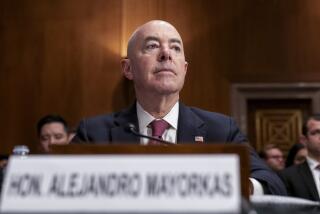Trump is impeached but unchastened

- Share via
WASHINGTON — For other presidents, a House impeachment — or just the threat of one — provided a reprimand so powerful that it forced fulsome apologies, dramatic changes in behavior and even a resignation under fire.
For President Trump, it’s just another flash of red in his bullfighting ring.
Far from shying away from a historic stigma, Trump’s reelection campaign texted supporters moments after the first article of impeachment passed Wednesday night, saying, “Pres Trump: Dems’ just voted to IMPEACH,” and calling for donations. It issued a similar plea Thursday under the heading “Officially Impeached.”
At least so far, Trump has treated the stain of impeachment as he has every other scandal and crisis in an administration that is whipsawed by them — by lashing out at enemies, spewing personal insults, refusing to express remorse and claiming he is a victim of a partisan injustice.
“I don’t feel like I’m being impeached because it’s a hoax, it’s a setup, it’s a horrible thing they did,” Trump said Thursday in the Oval Office as he sat with Rep. Jefferson Van Drew, a New Jersey Democrat who announced he was becoming a Republican in the wake of the impeachment vote.
Trump views impeachment as a political winner for him, a dishonor he can turn into a badge of defiance with his base. If he is reelected in November, he would be the first impeached president to win a second term.
“When a president realizes he can get away with bad behavior, we are in trouble,” said Timothy Naftali, a presidential historian at New York University.
“Impeachment itself was supposed to be a rebuke,” said David Priess, the chief operating officer of the Lawfare Institute, who has written a book about impeachment. “And we’ve lost some of that meaning.”
Trump would see acquittal in the Senate as “a sign he can do what he wants without any punishment,” Priess said.
Still, aides say Trump is angry about impeachment, and his frustration and fury have dominated dozens of tweets in recent days.
He also kept returning to impeachment during a nearly two-hour, grievance-laden rambling address to about 10,000 supporters Wednesday night at an indoor arena in Battle Creek, Mich., a state crucial for his reelection chances. Whether due to the cold, or his vexation, he appeared unusually red-faced for parts of the speech.
He also became cruel. While criticizing Rep. Debbie Dingell, a Michigan Democrat, for supporting impeachment, he suggested her late husband — Rep. John D. Dingell, the longest-serving congressman in U.S. history — was “looking up” from hell, drawing some boos from the crowd.
“Mr. President, let’s set politics aside,” she tweeted back. “My husband earned all his accolades after a lifetime of service. I’m preparing for the first holiday season without the man I love. You brought me down in a way you can never imagine and your hurtful words just made my healing much harder.”
Even some Republicans pushed back. One of them, Michigan’s Rep. Fred Upton, tweeted that he had “always looked up to John Dingell,” adding, “There was no need to ‘dis’ him in a crass political way. Most unfortunate and an apology is due.”
Trump did not apologize Thursday. “We had a great time last night, the room was packed,” he told reporters in the Oval Office.
Trump has never accepted traditional guardrails on his language or conduct, and he seldom shows remorse or offers apologies. He is unlikely to tone down his polarizing behavior now — especially if, as expected, he wins acquittal in the Republican-controlled Senate.
The House passed two articles of impeachment on a virtual party-line vote. The first, for abuse of power, concerned his attempts to press Ukraine to investigate his political rivals. The second, for obstruction of Congress, detailed his efforts to block House investigators from gaining access to documents and witnesses.
Even during the proceedings, Trump baited his accusers with brazen statements and actions.
After evidence first emerged in September that Trump had asked Ukraine to investigate former Vice President Joe Biden and his son, he publicly asked China to investigate as well.
When the House Judiciary Committee approved articles of impeachment on Friday, Trump invited Rudolph W. Giuliani, the loquacious lawyer who has operated as Trump’s personal factotum in Ukraine, to the White House in a show of defiance.
It didn’t seem to matter, at least to voters who consistently support the president. Polls show Americans have been largely unmoved by Trump’s impeachment drama. And he remained unbowed, demanding that fellow Republicans not only stick with him, but also defend his actions as above reproach.
Other presidents who faced impeachment responded far more carefully.
In 1868, as the nation struggled to reconcile after the Civil War, Andrew Johnson cut deals with his adversaries to avoid removal by the Senate, and later sought to redeem his image by winning a Senate seat.
In 1974, during the Watergate crisis, Richard Nixon resigned before the House could vote to impeach him because he knew the Senate would convict and did not want to become the first president removed from office. The twice-elected president had seen poll numbers plummet.
And after his impeachment in 1998, Bill Clinton publicly apologized for lying about his affair with an intern and completed his second term with soaring public approval ratings.
“The public liked him and liked his policies,” said Michael Waldman, Clinton’s chief speechwriter at the time. “The public was also mad at him over what he had done.”
Like Trump, Clinton was angry at his opponents and believed Republicans were using partisan politics to try to overturn his election. Unlike Trump, he sought to wall off his White House duties from the impeachment crisis, rarely acknowledging his frustration in public.
“He was cognizant of the fact that their goal was, if they couldn’t get him out of office and he routinely bested them legislatively, that [impeachment] would leave a black mark on him,” said John Podesta, who served as Clinton’s chief of staff during his impeachment. “So he focused on doing a good job.”
Trump has struggled to separate the two, rarely boasting about the booming economy or achievements without veering off into extended rants about Democrats, Hillary Clinton, the FBI and numerous other real and perceived enemies.
Asked Thursday whether Trump will — or should — change his behavior after the impeachment vote, Sen. Lindsey Graham (R-S.C.), a close ally of the president who tried the House case against Clinton in 1998, laughed.
“I think he should focus on having more weeks like we had where we did the USMCA and all that,” he said, referring to the House passage Thursday of the trade deal with Canada and Mexico that revamped the North American Free Trade Agreement. It now goes to the Senate for almost certain ratification.
Staff writers Molly O’Toole in Washington and Eli Stokols in Battle Creek contributed to this report.
More to Read
Get the L.A. Times Politics newsletter
Deeply reported insights into legislation, politics and policy from Sacramento, Washington and beyond. In your inbox twice per week.
You may occasionally receive promotional content from the Los Angeles Times.












